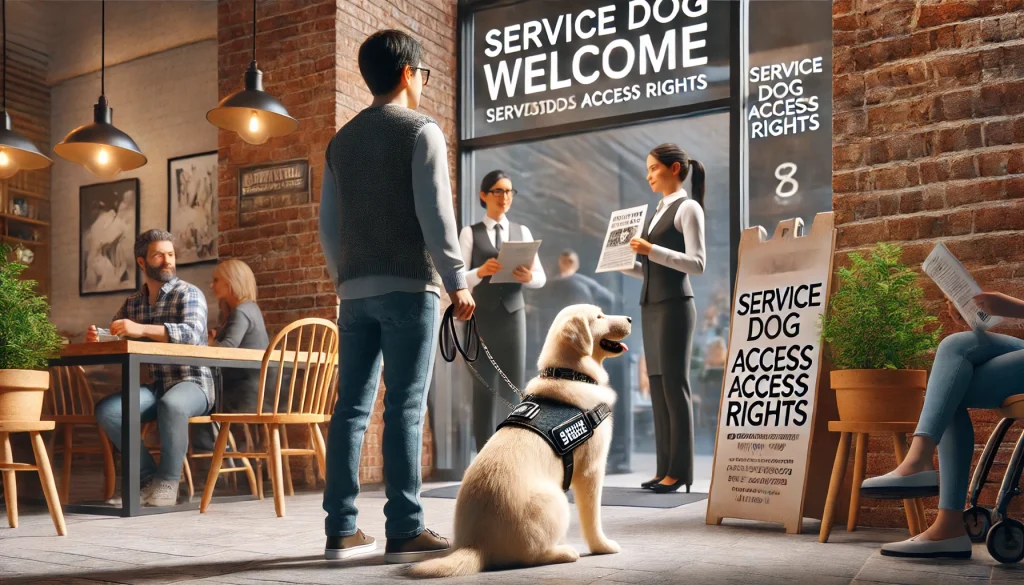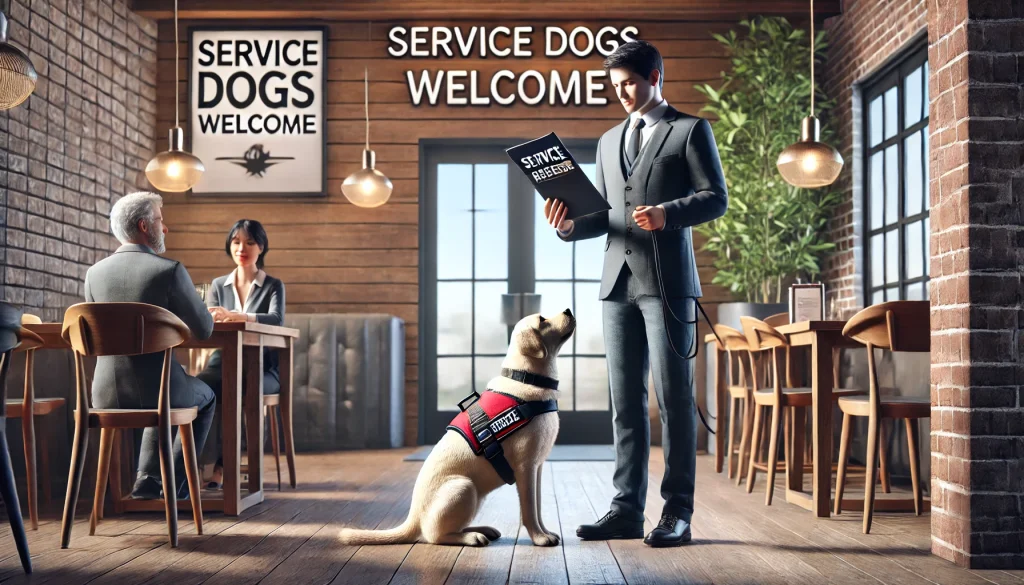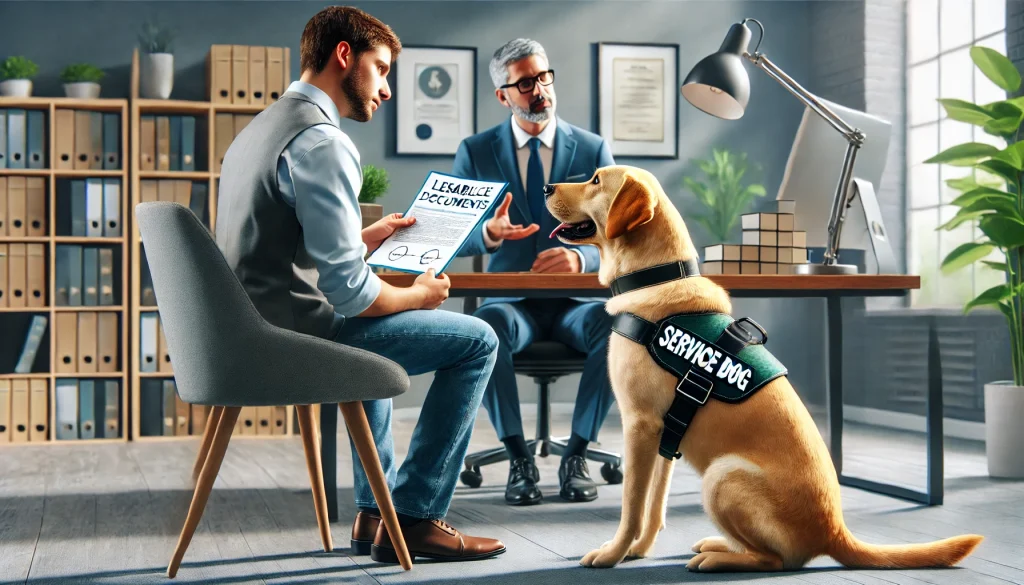Introduction
Experiencing access denial with your service dog can be frustrating and stressful. Understanding your service dog access rights and the legal protections for handlers is essential. This blog will explore how to handle such denials, provide you with a solid understanding of disability discrimination laws, and offer practical steps to address and resolve these issues. At ServicePupSolutions.com, we are committed to supporting service dog handlers and ensuring they know their rights.

Understanding Service Dog Access Rights
Service dogs are essential for many individuals with disabilities, providing them with the assistance they need to live more independently. Under the Americans with Disabilities Act (ADA), individuals with disabilities have the right to be accompanied by their service dogs in most public places.
Public Accommodations
The ADA mandates that service dogs must be allowed in public accommodations. These include restaurants, hotels, stores, and other businesses open to the public. These establishments cannot deny access based on the presence of a service dog.
Housing Rights
Service dog access rights extend to housing under the Fair Housing Act (FHA). Landlords must allow service dogs, even in properties with a “no pets” policy. This ensures that individuals with disabilities can live with their service dogs without facing discrimination.
Transportation Rights
Public transportation systems, including buses, trains, and airplanes, must accommodate service dogs. The Air Carrier Access Act (ACAA) specifically covers air travel, ensuring that individuals with disabilities can travel with their service dogs without additional fees.
Legal Protections for Handlers
Legal protections for handlers are crucial to preventing discrimination and ensuring access. Understanding these protections can help you advocate for your rights effectively.
Americans with Disabilities Act (ADA)
The ADA is a comprehensive civil rights law that prohibits discrimination against individuals with disabilities in all areas of public life. It includes specific provisions for service dogs, ensuring they can accompany their handlers in public spaces.
Fair Housing Act (FHA)
The FHA protects individuals with disabilities from discrimination in housing. It requires landlords to make reasonable accommodations, including allowing service dogs, to ensure equal access to housing.
Air Carrier Access Act (ACAA)
The ACAA prohibits discrimination in air travel. It ensures that individuals with disabilities can travel with their service dogs and that airlines cannot charge additional fees or impose unreasonable restrictions.

Handling Service Dog Access Denials
Facing an access denial can be challenging, but knowing the right steps to take can help you resolve the situation effectively.
Stay Calm and Informative
When denied access, remain calm and provide information about your service dog access rights. Politely explain that your dog is a service animal and is protected under the ADA.
Carry Documentation
While the ADA does not require documentation for service dogs, carrying a letter from your healthcare provider or service dog identification can help. Presenting this documentation can often resolve misunderstandings quickly.
Request to Speak with a Manager
If an employee denies access, ask to speak with a manager. Managers are typically more familiar with ADA requirements and can override an employee’s decision.
File a Complaint
If the denial persists, you can file a complaint with the Department of Justice (DOJ) for ADA violations. For housing issues, complaints can be filed with the Department of Housing and Urban Development (HUD). For air travel, complaints can be directed to the Department of Transportation (DOT).
Seek Legal Assistance
If you face repeated denials or discrimination, seeking legal assistance may be necessary. Disability rights organizations and legal aid services can provide support and help you take legal action if needed.

Disability Discrimination Laws
Understanding disability discrimination laws can empower you to advocate for your rights and ensure fair treatment.
Provisions of the ADA
The ADA covers various aspects of public life, including employment, transportation, public accommodations, communications, and access to state and local government programs. It ensures that individuals with disabilities have equal opportunities and are not discriminated against.
Enforcement of the FHA
The FHA is enforced by HUD, which investigates complaints and takes action against landlords who violate the law. The FHA ensures that individuals with disabilities have equal access to housing and can live with their service dogs without facing discrimination.
Compliance with the ACAA
The DOT enforces the ACAA, ensuring that airlines comply with the law and accommodate service dogs. The ACAA requires airlines to provide accessible services and prohibits discrimination against individuals with disabilities.
Importance of Pet Insurance and Service Dog Products
Maintaining the health and well-being of your service dog is crucial. Investing in pet insurance can help cover routine check-ups, emergency care, and specialized treatments, ensuring your dog remains healthy and effective in their role. Additionally, using the right service dog products, such as service dog vests, leashes, harnesses, and training tools, can enhance your dog’s ability to perform tasks and provide the necessary support.
Self-Training Options
Self-training your service dog is a viable option for many handlers. ServiceDogOwners.com offers resources such as training guides, instructional videos, and support forums to help you effectively train your service dog at home. Self-training can be a cost-effective and personalized approach to preparing your dog for its role.
Real Stories of Advocacy
Sarah’s Experience
Sarah, who relies on her service dog, Max, faced an access denial at a local restaurant. By calmly explaining her service dog access rights and providing documentation, she was able to educate the staff and gain entry. “It was a challenging experience, but knowing my rights helped me stand firm,” Sarah shares.
John’s Journey
John’s service dog, Bella, was denied access to a housing complex. He filed a complaint with HUD and received support from a disability rights organization. “Understanding the legal protections for handlers made all the difference,” John says. “Bella and I now live in a welcoming community.”
The Future of Service Dog Access Rights
As awareness and understanding of service dog access rights continue to grow, we can expect further advancements in legal protections and public acceptance. Continued advocacy and education are essential to ensure that individuals with disabilities and their service dogs are treated fairly and with respect.
Conclusion
Handling service dog access denials requires knowledge, patience, and persistence. By understanding your service dog access rights and the legal protections for handlers, you can effectively address and resolve these issues. At ServicePupSolutions.com, we are dedicated to supporting service dog handlers and providing the resources needed to navigate these challenges.
Investing in pet insurance and using the right service dog products can further enhance your service dog’s ability to support you. Whether you choose professional training or self-training options through ServiceDogOwners.com, ensuring your service dog is well-prepared and protected is essential.
By staying informed about disability discrimination laws and advocating for your rights, you can help create a more inclusive and understanding society. The journey to fair treatment and equal access is ongoing, but with the right tools and knowledge, you can make a significant difference.
Searching for a way to boost your income while keeping your service dog by your side? Learn how to launch a Side Hustle or new career and increase your earnings alongside your loyal companion. Click Here to find out more and start your journey today!






